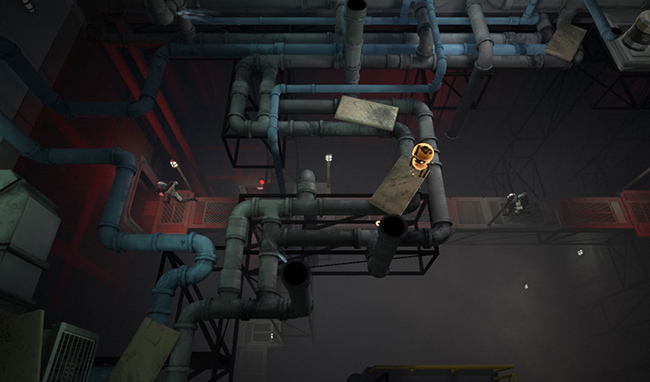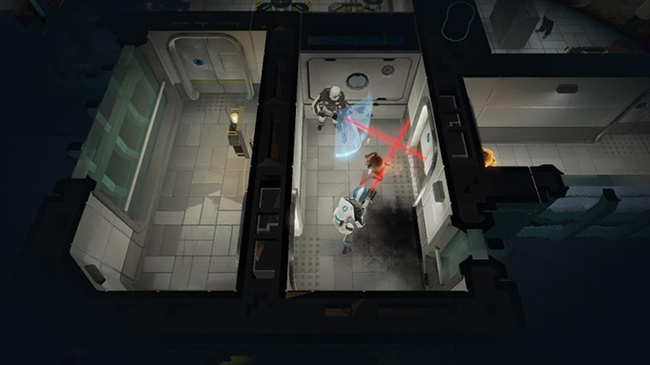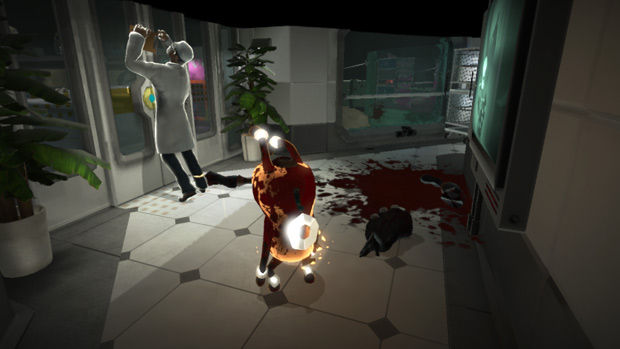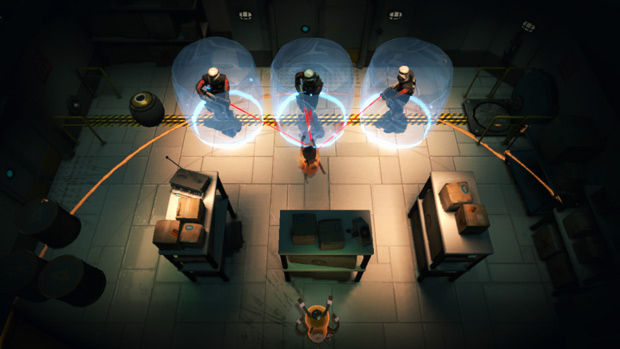Warp Dissection: There's Hot Sauce in the Gears
2013, January 31st 1:43 PMWarp is a puzzle-based stealth action game where you play as Zero, a little orange alien with a big score to settle!
I copied that off the game's website.
The important part is in the first five words. Warp is puzzle-based. That's how the game is billed, that's what I expected.

And let's get this out of the way: Warp is a good game. The puzzles are fun, the game is pretty, the plot is predictable but in the good we're-all-familiar-with-this-myth-so-let's-get-the-cliches-out-of-the-way-and-have-some-puzzle-fun manner. I like myths. Myths are good. Myths attached to a puzzle game are even better.
Zero, the playable character, has a host of special abilities. He can warp through solid walls and obstructions, he can warp inside objects and explode them from the inside, he can swap places with objects and he can launch objects at high speed. Note that "objects" includes "people". In most puzzle games, "people" are major puzzle pieces. In Warp, the only real difference between a turret and a person is that the person is easier to lure into important locations and doesn't shoot you as quickly.
It's all a recipe for a great puzzle game, and it's honestly somewhat tragic that it falls short.
The thing about good puzzle games is that, by their very nature, you'll have trouble with them. Some puzzle games are designed so that it's impossible to get stuck. Some are designed so that restarting is easy and fast. Warp is a bit of a curious beast in that it's also a stealth action game. Your opponents have guns, they are quick with their triggers, and you will die in a single shot. So: You die. You hit the "restart" button.

You sit there staring at a loading screen for ten seconds.
Which doesn't sound like a lot, but Warp is a very deadly game. The wrong approach can, and will, lead to death in seconds. Even when you're not being actively shot at, the world is littered with lasers and explosives and similar instant death traps. The second level starts with a puzzle that will kill you so quickly that failure results in spending more time loading than playing. And even when your plan is perfect and the area is harmless, Warp's sensitive controls will lead to you waltzing into lasers and warping yourself straight into death far more often than you'd expect.
Each time, accompanied by a ten second loading screen.
It is hard to describe how annoying that is, and it's just a herald of what lies in store.
Warp is filled with minor issues. Nothing that, in itself, would cripple the game. Things that I'd normally be remarking about in passing, as a minor blemish on an otherwise good game. But they just came so quickly and so relentlessly that it seemed every time I forgot about one, I'd run into another.
Example: The levels are filled, not just with armed guards, but with unarmed scientists. The scientists are terrified of you. Perpetually. Doesn't matter if you've carefully avoid killing scientists. Every time you warp into a room: screaming scientists. You can stand in the room for a minute and they just keep running around panicking, you leave the room, they recover and go back to work, teleport back in and it's Screamtown USA all over again.

This could have been improved in several ways. Iji does it brilliantly – avoiding slaughter in Iji eventually leads to the "enemies" allying with you, followed by an entire different branch of the game with a different ending. Extra endings and game branches take time and money, of course. Here's an easier idea: make the damn scientists quieter. As it is, every time you jump into a room you're greeted with an atmosphere-obliterating chorus of screeches. Or make them stop paying attention to you after a while! Maybe that's a reward for not killing them: they stop setting off alarms!
Another example: I mentioned Warp's controls. Most of my frustration revolved around Zero's Illusion ability, which allow him to project a duplicate of himself to trick enemies. The problem is that any damage done to the illusion, or any missteps into areas where the illusion is not allowed to go, will dissipate the illusion . . . causing Zero to instantly start moving in whatever direction the illusion was moving. If you use the illusion in a place where it's not allowed – even if a valid spawn point is literal inches away – the illusion will spawn directly in front of Zero, instantly disperse, and return control to Zero when you're least expecting it.
So if, for example, you decide to create an illusion and move it forward, and at that very instant a laser beam fires directly ahead of you, your illusion will walk into it, disperse, and before you have time to react, Zero will troop happily into it and die.
Cue ten-second load screen.
Not that this happened to me dozens of times over during the end boss fight or anything.

I can live with issues like this if the game is a low-budget affair, and doubly so if they're easy to recover from. Hotline Miami, an even faster-paced game released lately, is buggy as hell and had many fascinating problems and glitches as I fought my way through the levels. But in Hotline Miami, restarting the level is instant. And Hotline Miami's art is relatively simple, and its budget, I suspect, was quite minimal. For an indie game, Warp is a high-budget game, built on the Unreal engine, with detailed 3d models, good texturing, copious voice acting and cutscenes, and a boss that randomly and mysteriously fails to take damage from being attacked. Given the money spent on the rest of the game, the controls, loading times, and gameplay bugs are just unacceptable.
In the end, I kept feeling like the actual game had taken second tier to the rest of Warp. Compared to the amount of polish the art and atmosphere received, the gameplay was rough and spiky.
Warp is a good game. But with a little more work on the interface and a little more work on the game behavior, it could have been a lot better . . . even if that meant sacrificing a bunch of polygons.

